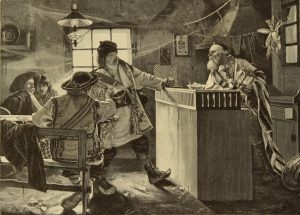After examining a cookbook and a general source on all things Jewish Food in my previous Jewish Food Bookshelf posts, how about a nice stiff drink? I am fascinated by the long and complex history of Jews and alcohol, and my lecture on the subject is one of favorites (and also a pretty fun one). One of my primary sources for a section of that talk is the book Yankel’s Tavern: Jews, Liquor, & Life in the Kingdom of Poland, by Glenn Dynner.
In it, Professor Dynner explores a surprising (to many) footnote to Jewish History: the fact that for a few hundred years, Jews essentially had a monopoly on the alcohol professions in Poland! They were heavily involved with production of both beer and spirits, and most importantly were dominant in running taverns, both in urban areas and even more so in rural ones.
Why Jews and Alcohol Was a “Thing” in Poland
At just 178 pages (not counting endnotes, etc.), Yankel’s Tavern succinctly answers the most pressing questions about Jews and alcohol in Poland. For starters, how and why did the Jews come to monopolize this industry? The primary answer is that the Polish nobles saw Jews as the best population segment for this job. They saw in the Jews people who understood business and would not drink up the product (though Dynner also shows how this belief was a fallacy, with plenty of drinking going on amongst the Jews there). Perhaps even more significant a benefit to using them for this, Jews were not nobles, but also were not the peasants who were the primary consumers of alcohol in the region. Thus, when tensions rose between the serfs and their lords, the Jews became a buffer, absorbing the brunt of the peasants’ anger and protecting the nobles at the same time.

Dynner also explains the apparent paradox by which anecdotal evidence shows continued Jewish tavernkeeping, despite official records that indicated they had largely been forced out of the industry during the first third of the 19th century. In brief, he uncovers a secret cooperation between the Jews and the Polish peasants who drank in their taverns, secretly maintaining the status quo while the government was kept unaware. This highlighted the unique dynamic of coexistence between Jew and Pole that blended antisemitic violence, daily familiarity, and even positive interactions, all occurring simultaneously.
Finally, the book also summarizes the reasons for the rapid decline of Jews in the alcohol industry in Poland during the late 1800s. Many factors contributed, though the primary one was a result of peasant emancipation in the middle of that century. As the story of Jews and alcohol came to a rapid close, this unique chapter in Jewish history was rapidly forgotten. Partially this was the result of how quickly it came to an end, but also due to the stigma that was attached to the industry, even when Jews dominated it.
Yankel’s Tavern as a Book
Dynner is of course an academic, but this book is designed for more mainstream audiences. While it remains scholarly, it is also quite readable, and should be enjoyable for anyone interested in the subject. While I have summarized a number of the main points above, there remains a lot more depth in the book itself, and it is well-worth a read.
Beyond that, Yankel’s Tavern also surprises the reader by challenging the accepted wisdom on a few topics. Exploring the degree of drinking among Jews in Poland and the unique relationship between Jews and Poles helps us gain a deeper understanding of what Polish-Jewish life was actually like before the Great Migration of the late 19th century, and the decimation the Holocaust wrought on the community in the 20th.
There are also two other books I might add for additional reading that will broaden your understanding of this topic, in general. Magdalena Opalski looks at the results of the Jewish monopoly on tavern keeping by exploring the trope in Polish literature. Her work is called The Jewish Tavern-Keeper and his Tavern in Nineteenth-Century Polish Literature, and is more academic, though still rather interesting. (It is out of print, but you might find it at the library.) A broader look at shtetl life, and a revision of the Fiddler on the Roof-inspired sterotype, Yohanan Petrovsky-Shtern’s The Golden Age Shtetl: A New History of Jewish Life in East Europe goes beyond the alcohol aspect, putting it into greater context.
L’chaim!






